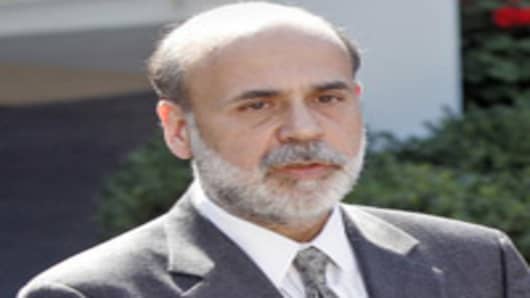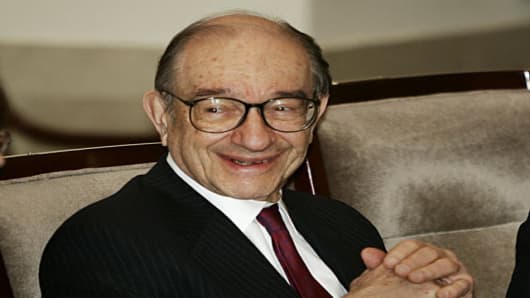It's been less than a week since the Federal Reserve hinted it was done lowering interest rates. Yet Wall Street is already clamoring for yet another cut.
The reason: fresh concerns about a growing credit crunch pushing the U.S. economy into a recession.
In the past two days alone, investors have heard new warnings about the credit crisis from such big names as George Soros, Bill Gross and Alan Greenspan.
On top of that, huge losses at financial giants Citigroup and Merrill Lynch have fueled worries that, as Gross told CNBC on Monday, the credit crunch is likely to get worse before it gets better.
"I think we are definitely in for a slowdown that I think will be a bigger slowdown than (Fed Chairman Ben) Bernanke is seeing," Soros said in a speech on Monday. The billionaire investor added that the U.S. economy is "on the verge of a very serious economic correction" after decades of overspending.
All this comes as the Fed tries to discourage investors from counting on any more rate cuts. In its statement last week, the central bank said that it was just as worried about inflation as it was about an economic slowdown, meaning it won't cut rates just to bail out financial markets.
Bernanke Faces Congress
But Bernanke, who testifies before the congressional Joint Economic Committee Thursday, will no doubt face tough questions about how the central bank is addressing renewed credit concerns that have wiped out billions of dollars in bank profits and cost two high-profile Wall Street CEOs their jobs.
Many investors are discounting data suggesting the U.S. economy is safely navigating a housing recession, and pleading for further interest-rate cuts to stave off what they fear will be an inevitable hit to the economy from tighter credit.
"They've (the Fed) always been data dependent, and the data will suggest that they will have to cut rates again," Quincy Krosby, chief investment strategist at The Hartford, told CNBC.com. "We've been on the side that there will be more rates coming. I think the bond market right now is suggesting that as well."
The case for a rate cut is being made by others, too. Former Federal Reserve Chairman Alan Greenspan said on Tuesday that falling U.S. home prices and high inventories of unsold properties presented a major risk to the U.S. economy and financial markets.
Greenspan said he was not "sanguine" about the how quickly the glut of unsold homes could be reduced.
"We still need to accelerate the rate of inventory liquidation, and that will mean bringing housing starts down and sales up. We have a long way to go," said Greenspan, who was answering questions at a CEO conference in Tokyo via video link from Washington.
"The critical issue on the whole subprime, and by extension the whole financial system, rests very narrowly on getting rid of probably 200,000-300,000 excess units in inventories in the United States," he said.
The drag from the housing market's downturn and the surge in defaults among subprime mortgage borrowers has hit credit markets around the world and prompted the Federal Reserve to slash interest rates to limit the economic fallout.
Gross: Worst Far From Over
On Monday, Bill Gross, chief investment officer of Pimco, the world's largest bond fund, told CNBC that credit markets face another $250 billion in defaults over the next two years, indicating that the worst of the subprime crisis is yet to come.
"We've only begun to see the pain from the standpoint of the homeowner in terms of those monthly payments," said Gross. "Defaults and delinquencies will increase as we extend throughout 2007 and into 2008."
Gross blamed "garbage loans" issued by large banks who couldn't guarantee them and consumers who couldn't afford them. Large lenders like Citigroup , Merrill Lynch and Bear Stearns will be paying the price, he said.
Gross's comments came the same day that JP Morgan said total losses stemming from writing down the value of mortgage-linked securities could be as high as $200 billion, with financial institutions sitting on at least $60 billion in losses that have not yet been disclosed.
Citi on Monday said its exposure to subprime writedowns increased to as much as $11 billion and could grow if the market deteriorates further. Merrill recently revised its figures regarding subprime writedowns, saying it would sustain an $8.4 billion hit.
The turmoil in the subprime mortgage-market is a "$1 trillion problem ... there are $1 trillion worth of subprimes and Alt-As and basically garbage loans," Gross said.




